Family has been at the heart of Winterthur’s story since the du Ponts settled here more than 200 years ago.
Today, Winterthur is still about family, with the Enchanted Woods play area enthralling young children for hours and upcoming programs that will entertain and educate family members, young and not-as-young alike. In fact, this fall we’re expanding our family programming on Saturdays, so stay tuned for more on that.
But summer is here, and there is much to do. We have Story Time scheduled for July 6 and 20, and our popular Terrific Tuesdays begin July 4 and continue weekly in July and August from 10 am to 3 pm.
Terrific Tuesdays this year will tell the story of the families who lived, worked, and played at Winterthur for decades before it became the museum, garden, and library that it is today.
Crafts, games, and demonstrations— all inspired by families who called this place home— will introduce history, art, conservation, and storytelling to kids ages 3 to 10 and the adults they bring along.
Winterthur has been home to three generations of the du Pont family, and it was a self-sufficient community where more than 250 people ran a thriving farming operation that included beef and dairy cattle, sheep, pigs, poultry, horses, fruit, and vegetables.
Today we’re going to tell you some stories that were collected in 1973 from Maurice Gilliand, who began in 1944 to serve as a footman to Winterthur Museum founder Henry Francis du Pont (1880–1969). As Gilliand would quickly learn, du Pont was a renowned horticulturist with specific tastes, a love of food, an eye for décor, and a complicated disposition that could be prickly and kind, oftentimes at once.
Gilliand came from France to America in 1930 and he worked in houses on Long Island before coming to Winterthur. Gilliand’s wife, Doris, was hired as a chambermaid, and the couple lived in a small house on the estate.
There were about five footmen and a butler among a staff of 20. After two years, Gilliand was promoted to butler. Gilliand was flattered when du Pont made the offer, although he noted that du Pont warned him at the time that he was demanding and expected perfection. Gilliand nonetheless accepted and went on to learn a lot from du Pont.
“My duties were to set the table, of course, serve the meals, serve the teas, and serve cocktails and all that, and I was the man responsible to Mr. du Pont for the rest of the staff,” Gilliand recalled during an interview that is part of ongoing initiatives to preserve the history of the estate.
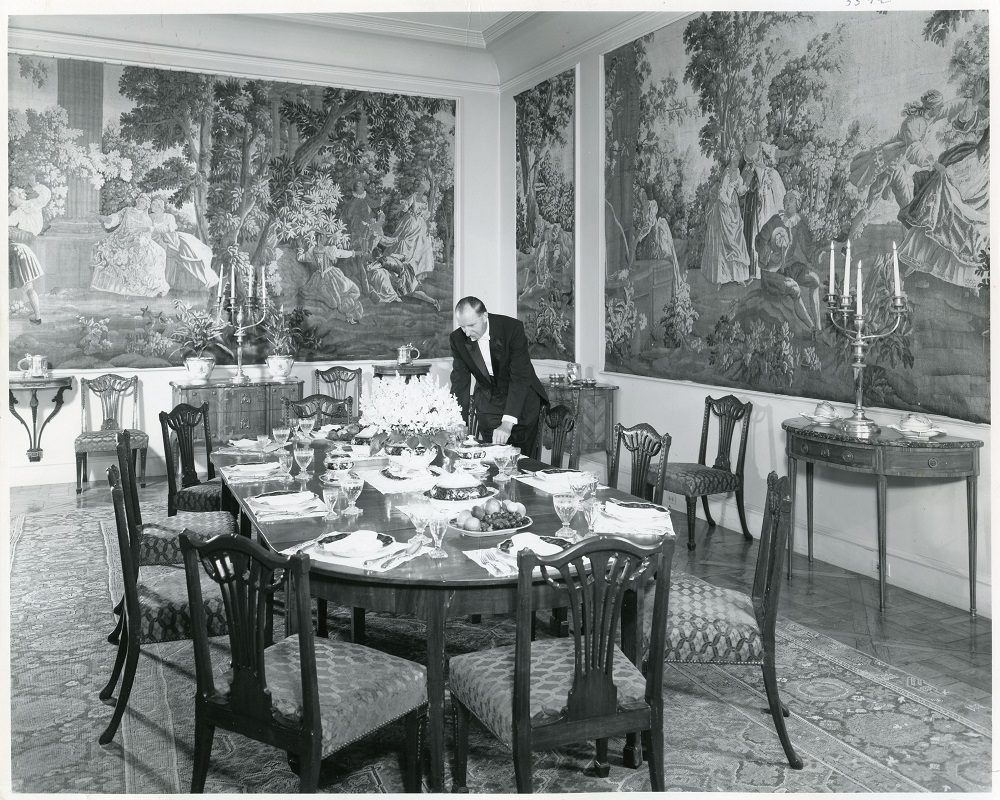
“And you directed the rest of the staff?” the interviewer inquired.
“I must say Mr. du Pont was the head butler,” Gilliand replied.
“Just as he was head gardener,” the interviewer observed. “Was the operation here different in any way from the other houses you had worked in? Was Mr. du Pont special in his approach?”
“Well, yes, much more so because any other house where I worked, the lady was in charge, but here Mr. du Pont was in complete charge of the house and planned everything, planned all the menus, and planned all the table settings,” Gilliand said.
On the weekends, the house would be filled with 16 to 18 house guests, with other visitors present only for meals, making two dozen people for a formal dinner.
On Wednesdays, a gardener would bring flower samples into the house for du Pont and Gilliand to match with china, table mats, and glassware for the dinner.
“Sometimes Mr. du Pont would ask me my opinion and then would say, ‘Maurice, Maurice, you must be color blind!’,” Gilliand remembered. “Now and again, Mr. du Pont would give me a free hand to make a selection. On one occasion when guests entered the dining room, they exclaimed, ‘Oh, Harry, Harry what a beautiful combination,’ and Mr. du Pont replied, ‘Oh yes, I have had this set of china for a long time, and this is the first that I was able to match it successfully.’ As I was standing nearby, he looked at me with the corner of his eye and winked, but he said, ‘I must admit to you it was Maurice who achieved this masterpiece.’ After dinner, Mr. du Pont put his hand on my shoulder and said, ‘Maurice, you have learned your lessons well, you are not color blind any longer.” This shows you that when you knew Mr. du Pont’s likes and dislikes, it did not take much to make him happy.”
The weekend guests arrived on Friday afternoons and were received in Port Royal Hall.
In the hall, it was mandatory for guests to sign the guestbook. Then tea was served in Port Royal Parlor, after which guests were taken to their rooms, Gilliand said.
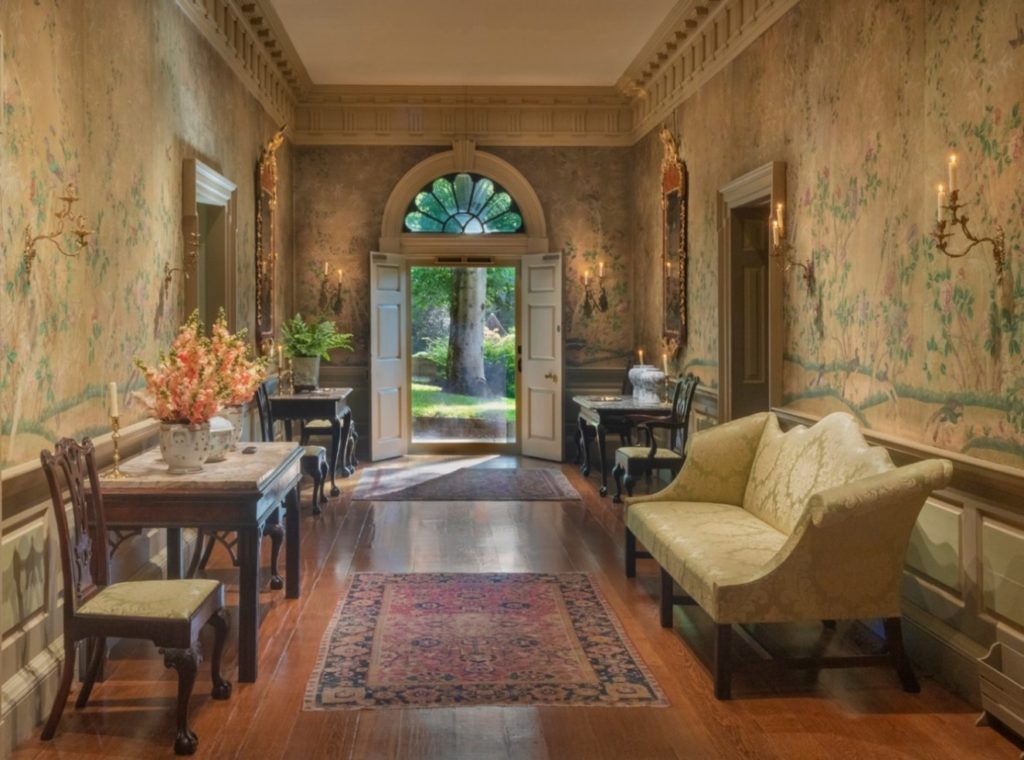
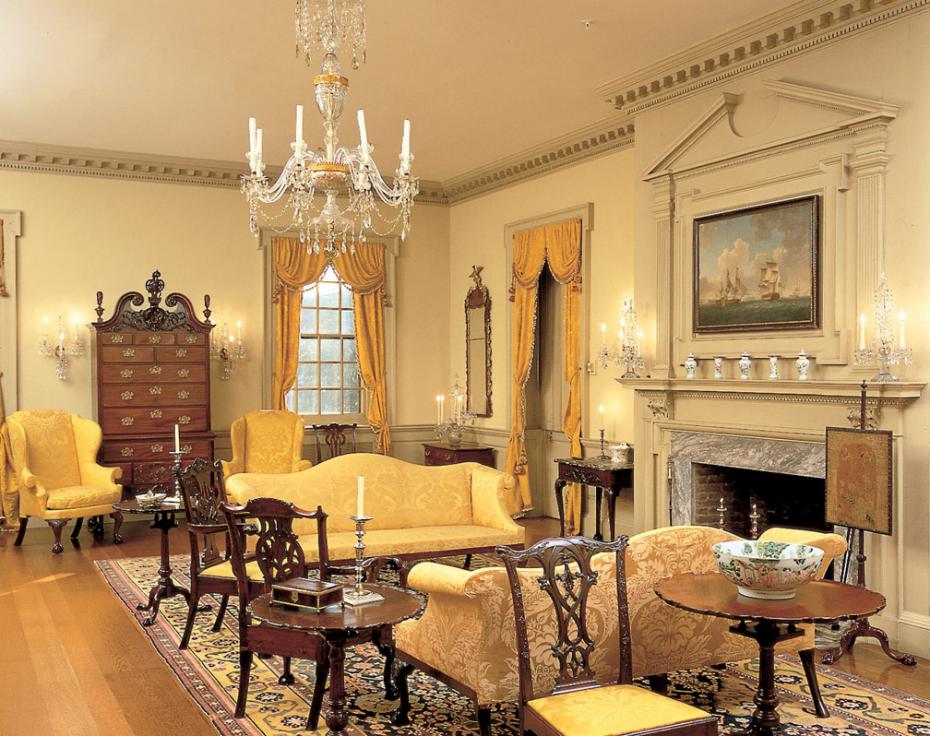
The footmen served cocktails at 8 pm in the Chinese Parlor and dinner at 8:30 in the Du Pont Dining Room.
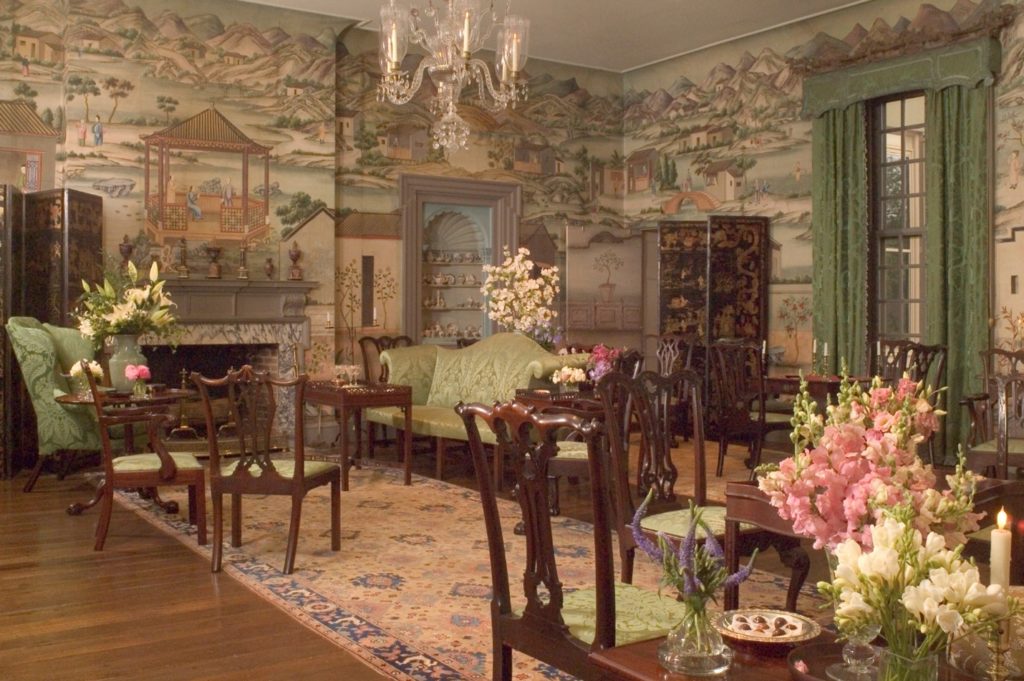
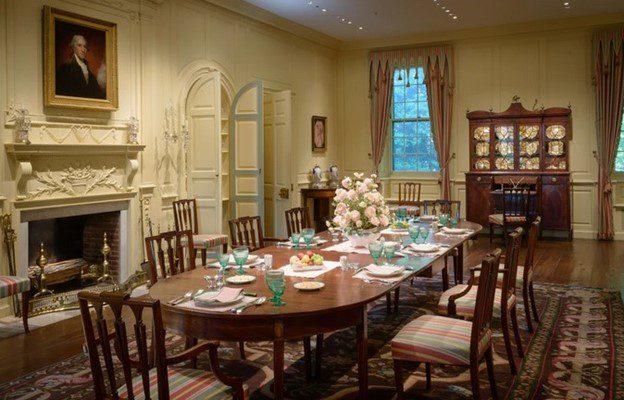
“The food was plain, but the best, as it was nearly all produced on Winterthur Farms,” Gilliand recalled.
While the guests were dining, footmen and chambermaids took turns scrambling upstairs to tidy the guests’ bedrooms and put away all their clothes and belongings. They also removed the “good bedspreads” so no one would lie on them. Those bedspreads were just for decoration.
The du Ponts and their guests played bridge after dinner (Mr. du Pont was an expert) in the Chinese Parlor and the Marlboro Room.
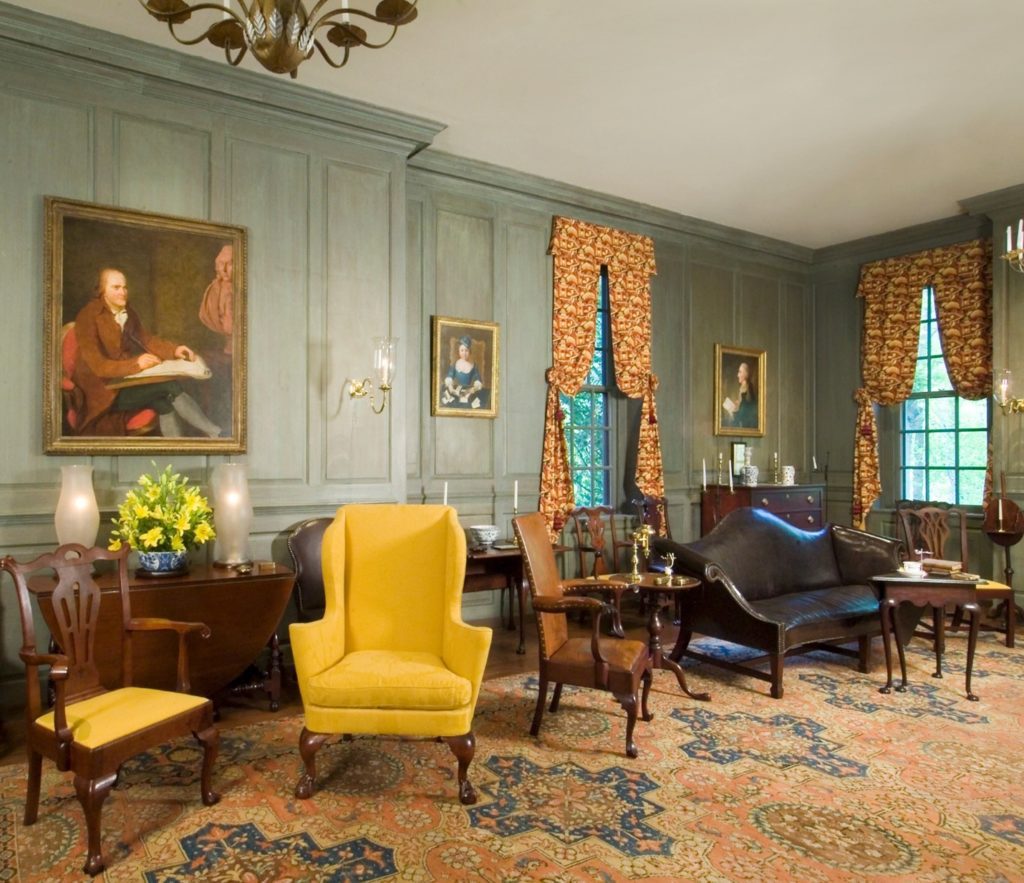
Footmen served refreshments and sandwiches at 11 pm, and the game would resume until the wee hours of the morning.
Other nearby rooms—the Baltimore Room, Chestertown Room, and Empire Parlor–were never used for entertaining.
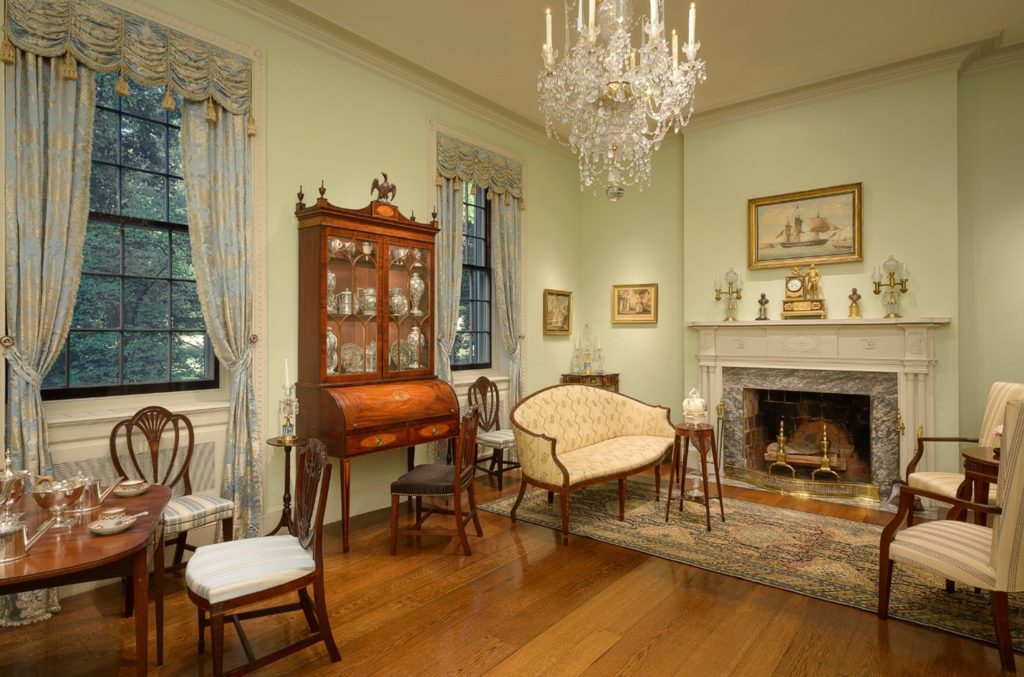
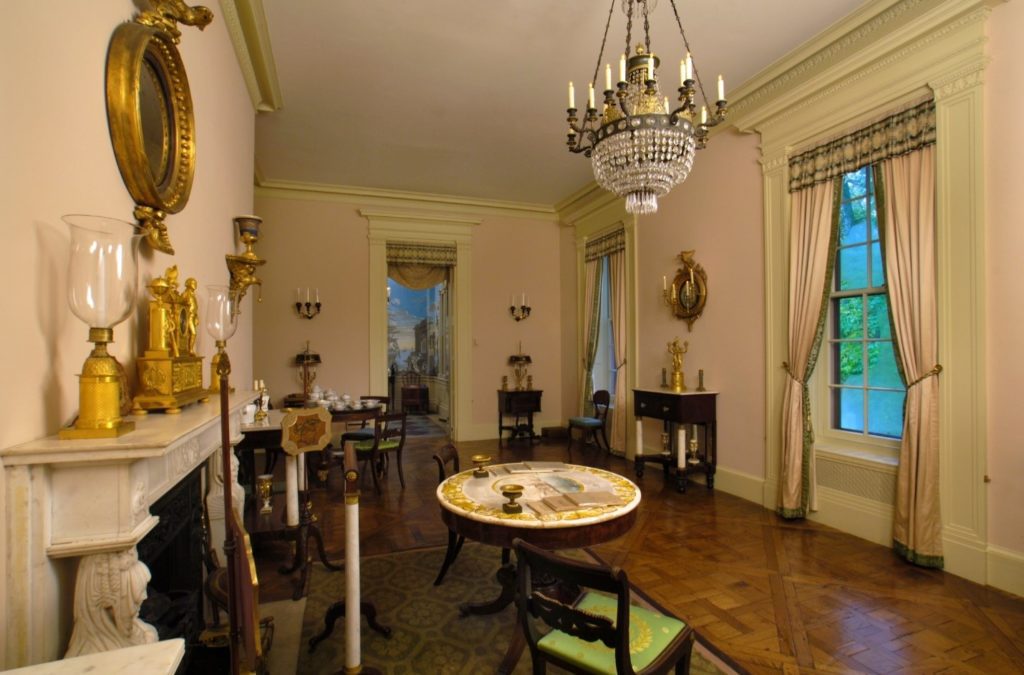
“These rooms were only for show,” Gilliand said. “Guests were never allowed to sit. Mr. du Pont was very strict about that. If he caught any sitting or leaning— No those were not used.”
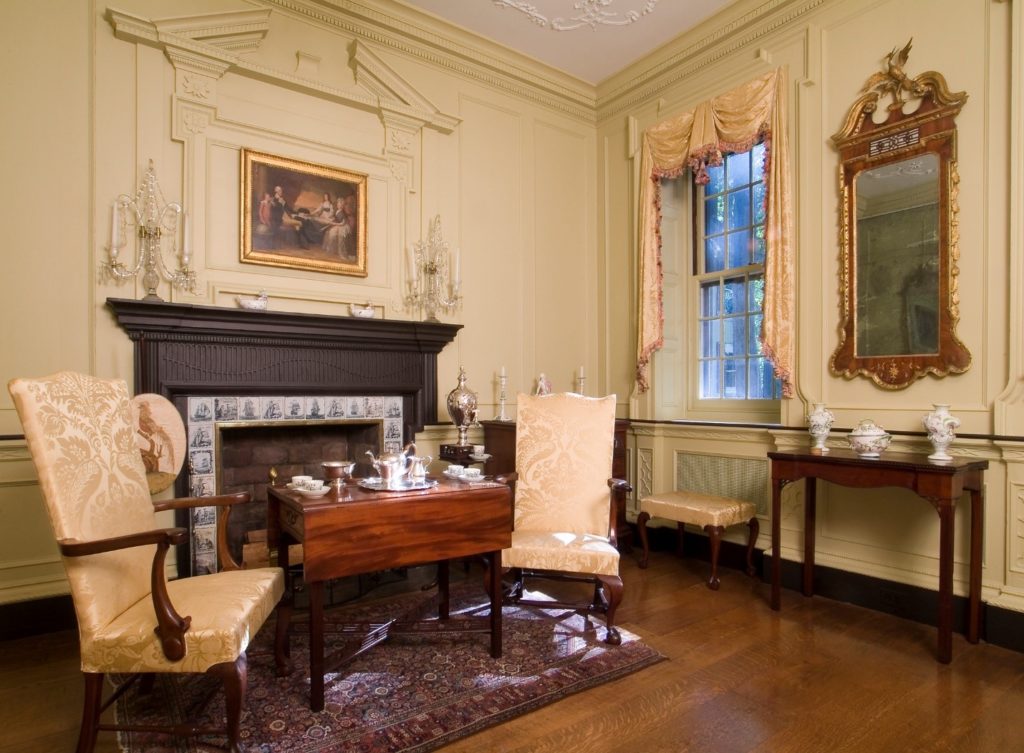
Though the Chestertown Room was referred to as the “breakfast room,” the du Ponts and guests never ate there. They were instead always served breakfast in their bedrooms.
Gilliand said he believed he had only ever made one serious mistake for Mr. du Pont, and it wasn’t leaning on the furniture.
“I’ll never forget it the rest of my life,” Gilliand said.
Du Pont had told Gilliand to telephone a woman and include her on the guest list for an upcoming occasion. Unfortunately, Gilliand misunderstood the name.
“I came back to Mr. du Pont, and I said, ‘Mr. du Pont, Mrs. So-and-So accepts with pleasure,’” Gilliand said. “He said, ‘What lady?’ I said, “Mrs. So-and-So you invited.’ He said, ‘Maurice, damnation, damnation, how could you do such a thing, how could you? I didn’t want that lady for this dinner.’”
At that point, it was up to Gilliand to find a gentleman who could accompany the woman to the dinner. Or, at least, those were Mr. du Pont’s orders.
But Gilliand chose to solve the problem in a more straightforward way: He called her back and admitted his mistake.
He asked the woman if he could tell Mr. du Pont that she had overlooked a scheduling conflict and could not attend. He also asked whether she would keep the matter between herself and Gilliand.
She said, “Oh, don’t worry, Maurice, it won’t go any further.”
Gilliand returned to the study where Mr. du Pont was speaking with someone. Du Pont immediately told Gilliand to enter, as he always did, and the butler explained, “Mrs. So-and-So didn’t realize she had a previous engagement and she will not be able to keep your dinner date.”
Du Pont replied, “Maurice, too bad, too bad, sorry to hear about that.”
Gilliand said he did not know du Pont’s wife, Ruth, very well because she dealt exclusively with the female servants.
But Gilliand did know that she liked to tease her husband by pretending she could not hear him.
“So, he would repeat it and she would say, ‘What did you say, Harry?’ and he would blow his top,” Gilliand said. His wife would laugh and smile.
One time, du Pont yelled at Gilliand for something similar.
Gilliand legitimately did not understand something du Pont was saying, partly because he was speaking while holding a cigarette in his mouth.
After Gilliand twice asked du Pont to repeat himself, du Pont began to yell.
“So, I just walked out very quietly into the pantry and stayed there for a couple of seconds and I walked back and said, ‘Now, sir, what is it you are trying to tell me?’ Very nicely he came and told me what he wanted. After that, he never shouted at me, never.”
Du Pont treated his staff well and worked alongside them, Gilliand said.
During the week, Mr. du Pont would be up at 6 am and have a simple breakfast of “a glass of milk and a glass of orange juice.” He would then receive all the supervisors of the estate in his study to get an update on operations.
On the occasion of a large wedding with several hundred guests at the estate, du Pont threw a party for the staff when the wedding and reception were over.
“He left me enough wine, champagne, and whiskey to share with the staff,” Gilliand said.
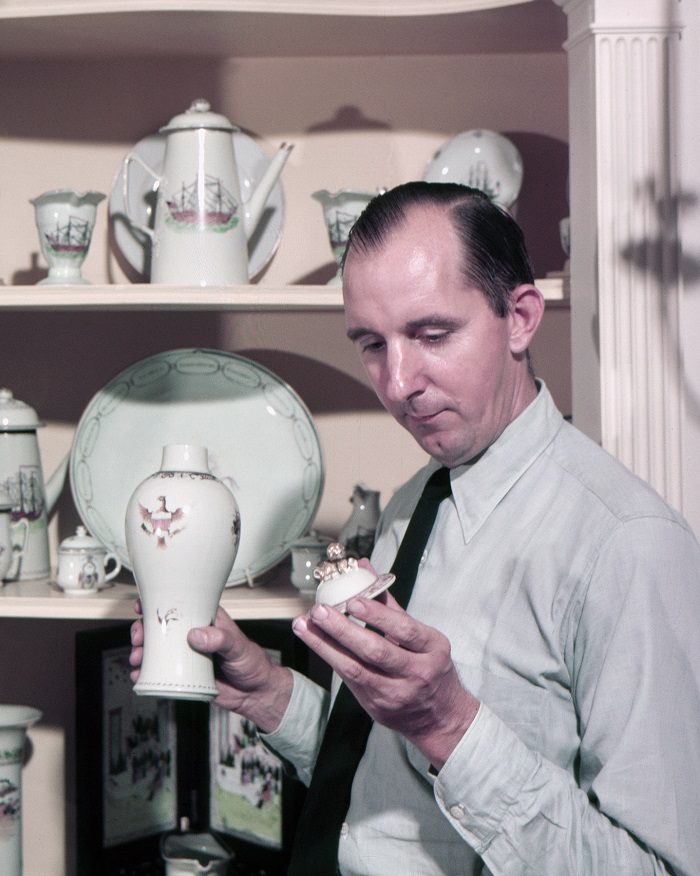
“Mr. du Pont was a very good employer, kept many of his people for a lifetime,” Gilliand said. “He never was too busy to chat, or discuss problems, if any, and help you if he could. To me, he was a friend. I am still grateful for all the knowledge he gave me of American art, and he is missed by many of us.”
You can learn more about life at Winterthur during the upcoming Terrific Tuesdays.
The family that will be featured on the first Terrific Tuesday had roles running Winterthur’s post office, with the father also serving as a chauffeur to Mrs. du Pont.
One of the girls in the family recalls being on the farm with the du Ponts’ daughter, Ruth, and going with her to drink milk “straight from a cow.”
Bottoms up, and see you at Terrific Tuesday!
